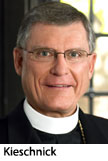Synod President Gerald Kieschnick is urging LCMS leaders to continue dialogue about matters on which there is theological unity and division in the Synod.
He makes that appeal in a presentation titled “Theological Unity and Division in The Lutheran Ch
Early in the presentation to the Council, Kieschnick wrote that in his six-and-a half years as Synod president, “I have heard many in the Synod express their joy and thanksgiving to God for the doctrinal and theological unity which, in the opinion of many, surpasses that of most other Christian church bodies today. At the same time, however, I have also heard others express their belief that the Synod is deeply divided doctrinally, concerns that I do not take lightly.”
Kieschnick notes that all rostered members of the Synod (“in accordance with Article II of the Synod’s Constitution”) agree that God’s Word is “the only rule and norm of faith and practice” and that the Book of Concord’s writings “are a correct exposition of the Holy Scriptures.”
He presents a list of 32 points on which the Synod “has repeatedly stated in its Constitution, Bylaws, doctrinal resolutions, and doctrinal statements” that it “believes, teaches, and confesses.”
“While the list … is not intended to be an exhaustive list,” he told the Council, “it is my hope and prayer that this articulation of what our Synod believes, teaches, and confesses will contribute to our joint efforts ‘to conserve and promote the unity of the true faith’ and that it will assist you as you assist me ‘to promote and maintain unity of doctrine and practice in all the districts of the Synod'” (LCMS Constitution, Articles III and XI).
“With no apology or hesitation,” he continued, “I assure you, dear brothers in Christ, as I have in the past, that I believe, teach, and confess exactly what has been articulated in this presentation, namely, the theological and doctrinal positions of The Lutheran Church–Missouri Synod.
“What I believe, teach, and confess today is the same as what I first learned at home from my father and mother, what was reinforced by my grandfathers and grandmothers, what I was taught in confirmation class … and what I have learned throughout my life since then, continuing through seminary graduation, as a parish pastor, district and synodical leader. … I believe these teachings and confessions not simply or solely because they are the positions of our Synod, but because I am personally persuaded and convinced that they are the correct teachings of Holy Scripture and that they are in accord with the Lutheran Confessions.”
“At the same time,” Kieschnick stated, “many are aware that there are matters about which we in the LCMS are not in agreement.” He said that those “realities precipitate questions,” such as:
- “How united or divided is the LCMS?
- “On what matters are we agreed?
- “Conversely, on what matters do we disagree?
- “Do the points of disagreement and division in our Synod deal with doctrinal matters or with matters of implementation of doctrinal principles?
- “Are the divisions or disagreements that exist among us primarily matters of faith and practice, or are they for the most part differences of opinion in matters of adiaphora — matters neither commanded nor forbidden by Holy Scripture?
- “Is the LCMS deeply divided, or are our disagreements primarily related to the fact that for a variety of reasons — including disagreements regarding administrative decisions, official opinions, or adjudicatory judgments of panels, boards, committees, commissions, employees, or officers of the Synod — some members of the Synod have grown to dislike or to distrust one another?”
Quoting from his report to the 2007 Synod convention, Kieschnick provided a review of what he describes as “some of the most important and most recently-discussed doctrinal and theological beliefs, teachings, and confessions of our Synod” — matters involving close Communion, church and ministry, the service of women in the church, and worship.
He later added to those points inter-Christian relationships, “differing understandings of what constitutes unionism [and] syncretism, [and] specific issues relating to participation in civic events.”
“In addition to this review, I believe it is important that further dialogue about these matters continue to take place that would involve the Council of Presidents and other leaders of our Synod,” he said.
Kieschnick noted that Synod and district theological convocations in 2002 and 2005, and another one planned for August of this year, are held with the “purpose” and “focus” of promoting and maintaining unity in the Synod by addressing such issues.
Further quoting from his report to the Synod’s convention last summer, Kieschnick emphasized that efforts should be strengthened in years ahead “to achieve similar solidarity in the matters of practice or application of doctrine on which we do not have unanimity.”
He said such efforts should involve the Synod’s Commission on Theology and Church Relations, Council of Presidents, seminary faculties, Synod leaders, ordained ministers, commissioned ministers, and lay leaders.
Concerning “differences in perspective within our Synod,” Kieschnick encouraged the COP to work together and “in your respective districts … to address these matters on the basis of Holy Scripture and the Lutheran Confessions.”
“Where we in the Synod are able under the grace and blessing of God to persuade one another beyond any reasonable doubt that clear passages of Scripture or the Confessions address these matters, we will rejoice! Where we are unable to achieve such persuasion, it behooves us, through mutual conversation, consolation, and collaboration, to come to a godly conclusion regarding how to proceed with mutual respect and non-offensive conduct,” Kieschnick told the Council.
In his presentation, he also offers “a brief word about division in our Synod directly or indirectly related to disagreements regarding administrative decisions, official opinions, or adjudicatory judgments of panels, boards, committees, commissions, employees, or officers of the Synod.”
“Such disagreements,” Kieschnick said, “properly expressed and discussed, are indeed appropriate. Elected and appointed leaders are always accountable for their decision
